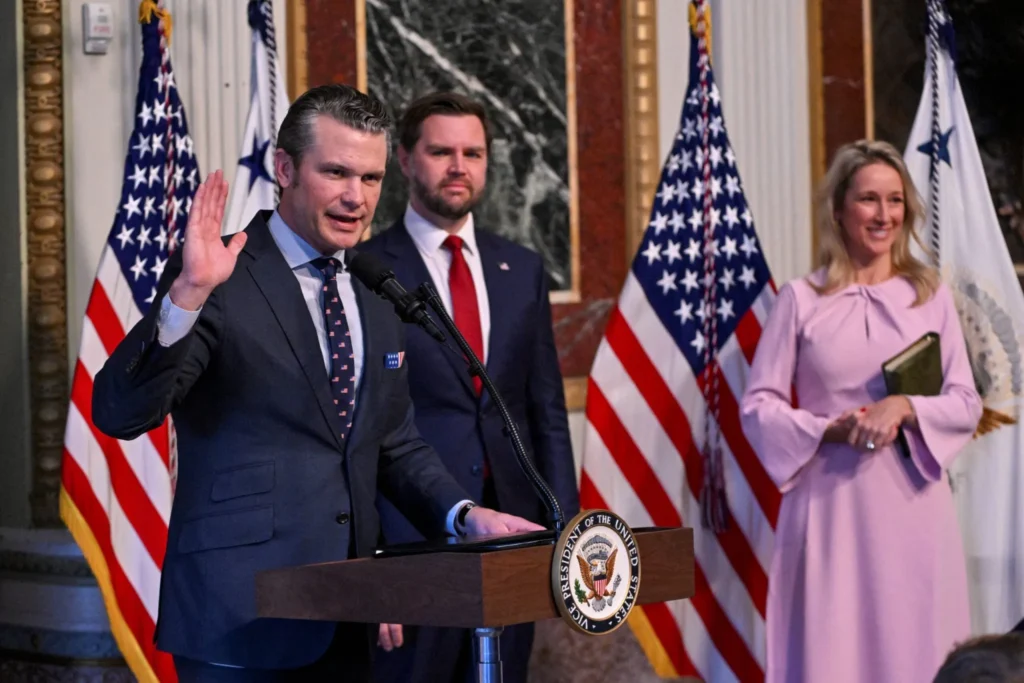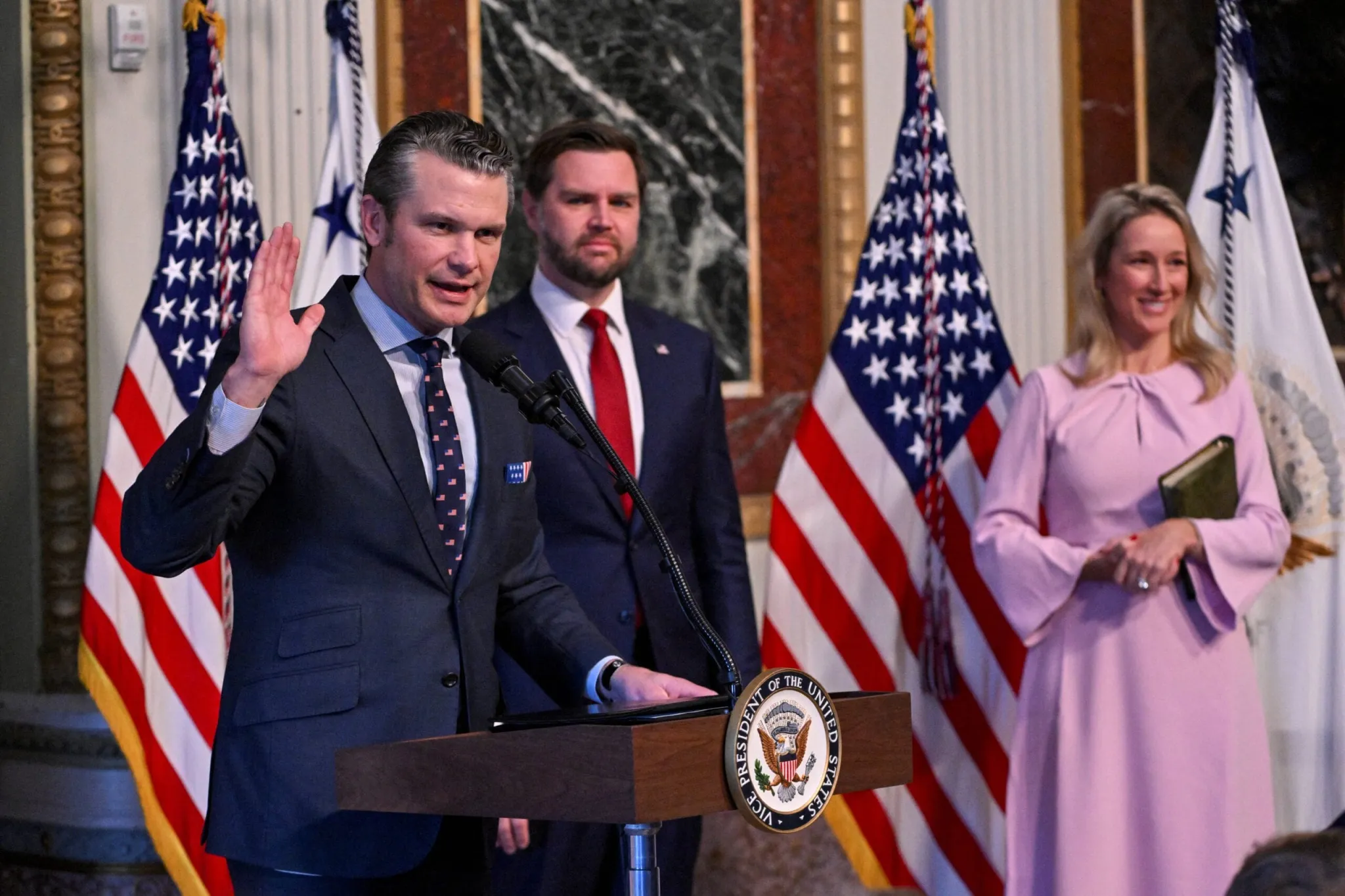
Have you ever wondered how conversations behind closed doors shape the policies that affect your daily life? Access to such conversations is rare, but every now and then, a leaked chat provides a glimpse into the heart of power—often revealing stark differences among those tasked with implementing national policies. Recently, a group chat involving top officials from the Trump administration was leaked, exposing an ideological divide that could signify a broader fracture in American foreign policy.

The Significance of the Leaked Chat
Curiosity drives us to understand what exactly was so revealing about these chat logs. Imagine discussing a holiday meal plan with family: while you may think everyone agrees on the menu, a candid group text soon reveals that Uncle Joe wants traditional turkey while Cousin Sue insists on a vegan option. The Trump officials’ leaked chat is similarly revealing—a window into the conflicting visions that shape America’s international role, particularly in relation to the “America First” policy.
The Accidental Inclusion That Changed Everything
The accidental inclusion of Jeffrey Goldberg, the editor-in-chief of The Atlantic, in a Signal group chat was more than a snafu; it was a monumental oversight that laid bare thoughts usually reserved for the highest echelons of government. Goldberg found himself part of a conversation detailing plans for airstrikes in Yemen, a discussion that revealed the complexities and incoherencies of the Trump administration’s approach to foreign policy.
The Vulnerability of Using Signal
This blunder also highlighted the risks associated with using commercially available apps like Signal for sensitive discussions. Signal is designed for easy communication and encryption, but it’s not impervious to penetration by foreign adversaries. This decision also raises questions about accountability, as using an app circumvents public records laws designed to ensure government transparency.
Ideological Incoherence in Action
At the core of the debate exposed by the leaked logs is a profound ideological conflict within the Trump administration. The discussion revolved around two contradictory approaches: should the United States assert its role as the world’s dominant power, or should it scale back its commitments to focus internally?
The Divided Approach to “America First”
Two factions in the administration emerged, each interpreting “America First” with varied lenses. One camp believes in retaining America’s global supremacy, while the other advocates for a defensive posture that prioritizes domestic issues over international engagements.
- Global Dominance: This faction sees the U.S. as a policing force ensuring international stability.
- Inward Focus: This group wants America to prioritize its own needs over international obligations, questioning the merit of entanglements in global affairs.
This divergence isn’t just a minor disagreement; it forms the backbone of policy decisions that affect global relationships.
The Yemen Airstrikes Debate
One particularly contentious issue exposed in the chat was how to approach the Iranian-backed Houthi rebels in Yemen, known for disrupting international shipping routes. The discussion was led by Vice President JD Vance and Secretary of Defense Pete Hegseth, whose clashing perspectives symbolize the broader divide.
Understanding the Houthis’ Impact
The Houthi rebels were targeted by the administration due to their assaults on global shipping lanes. While these attacks posed a significant threat to global trade, their frequency had declined thanks to international efforts. So, why then, should America involve itself militarily?
Assessing the Tangible Threat
The past impact of the Houthis on global trade cannot be understated. At their peak, their activities significantly hampered shipping routes, creating ripple effects across the world economy. However, changes in shipping routes and military operations had since mitigated this threat.
The Complication with Europe
Vance questioned the rationale behind continuing airstrikes, noting that America’s interest in the matter was minimal compared to Europe’s heavy reliance on the affected shipping routes. His perspective reflected a desire for restraint, avoiding unnecessary conflict unless directly beneficial to American interests.
Pete Hegseth’s Perspective
On the other side, Hegseth argued for maintaining military oversight, emphasizing the importance of ensuring Freedom of Navigation as a core national interest. He illustrated a belief in America’s responsibility to uphold the liberal international order, irrespective of who benefits most immediately.
Miller’s Middle Ground: Both Ways or No Way?
Adding a layer of complexity, Stephen Miller injected a transactional angle into the discussion, advocating for military action while demanding economic compensation from allies like Europe. This approach attempted to reconcile the contradictions, but ended up exemplifying the incoherence saturating Trump’s foreign policy.
An Undermining Transactional Strategy
Miller’s stance underscored a transactional worldview: America should lead globally but should also be rewarded economically for doing so. This reflected an expectation to be reimbursed not only for exerting military might but for stabilizing economies from which everyone, including the U.S. itself, benefits.
A Global Concern
Global shipping security is not just any other bilateral matter; it concerns every nation involved in global trade. Attacks on shipping lanes affect prices and supply chains universally, particularly when the global economy operates as one connected entity.

The Absence of a Coherent Doctrine
How does this play out in daily governance? Despite holding the highest office, Trump’s attitudes reflect this duality, championing America’s greatness while decrying foreign entanglements. This paradox is not just a personal inconsistency but also a strategic puzzle for decision-makers across the administration.
An Administration Divided Against Itself
When dealing with strategic decisions like Yemen, a clear policy doctrine usually governs action. However, the Trump administration’s simultaneous adherence to conflicting beliefs breeds uncertainty, hindering a consistent approach to foreign policy challenges.
The Need for a Unified Vision
Without a definitive American foreign policy doctrine, unity remains elusive. A leader must resolve ideological fractures within their team to ensure policies can be consistently applied. In the absence of such clarity, the nation lurches between assertiveness and isolationism—sometimes within the same conversation.
Lessons from the Leaked Chat
What can you take away from this peculiar incident? It exposes not just the whimsical, often volatile nature of high-stakes political discussion, but also the broader impacts of such disjointed thinking.
Transparency in Governing
While government must sometimes operate in confidentiality, ensuring public records integrity is crucial. Mechanisms for oversight and accountability protect democracy and build trust among citizens.
Understanding Ideological Divisions
Political disagreements are natural, and even healthy, within an administration. However, when these differences become unmanageable, they prevent coherent policy formation, especially in international relations.

Crafting Policies That Align with Reality
Ultimately, U.S. foreign policy ought to consider both national interests and global responsibilities. A genuinely introspective approach can acknowledge the dual needs of maintaining America’s strength and prioritizing national concerns.
Striking a Balance
A viable doctrine would encourage strategic international alliances while allowing for prioritization of immediate national interests. This nuanced approach respects both global interdependence and domestic priorities, aiming for a harmonious and effective foreign policy.
Moving Forward
Reflect on how diverse perspectives on foreign engagement can coexist within a single administration. Striking the right balance between global leadership and national focus marks the path to crafting resilient policies that withstand ideological pressures.
As the world becomes increasingly interconnected, clear coherency in policy isn’t just a lofty ideal—it’s a necessity. Only through considered, consistent strategies can America continue to navigate the complexities of the international stage while fortifying its own foundation. Keep questioning, keep observing, and remain informed—it’s through understanding these complexities that one can grasp the full spectrum of political decision-making.